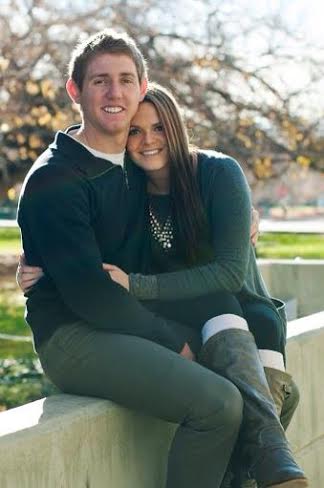For Marriage Month I only asked a few people to share guest posts…and Feisty Harriet was the first I reached out to. She and I have been blog friends for a while. Then she moved to Arizona just so I could meet the woman behind the pseudonym and we could be real life friends! (Kidding. She moved so she could live with her husband. It’s not ALWAYS about me.)
Her marriage situation is pretty unique and often complicated, but I so admire her efforts to make it work. Her words here are raw and vulnerable and an honest punch to the feels in the best way possible. Which is exactly why I love this woman.
If you’ve ever read an article on marriage—and I’m going to hazard a guess that you have—you probably heard that the key to a successful relationship is “good communication.” There are easily ten thousand examples and data points that support this theory. We know that being open and honest and forthcoming with our significant other, and them being open and honest with us, is the building block to a strong marriage.
Ok. That’s all fine and good, but for me, it’s only a partial truth. Good communication sounds so business-y, so clinical; something you strive for in the workplace, or with that buttoned-up organization where you volunteer. For me, good communication is a super general, umbrella term, and it means bupkiss if it doesn’t come with a hefty dose of vulnerability from both parties. Without two-way vulnerability, all marriages my marriage will fail.
Now, I hate feeling vulnerable; I’ve taken care of myself, all by myself, for a very long time, thankyouverymuch. I married super young, it was horrible, and I walked away with a trail of flames, blood, and shattered dreams in my wake, determined to never let it happen again. Vulnerability doesn’t factor into my Independent Lifestyle. About five years ago I remarried. I’m now in my thirties and a stepmom to two teenagers. On top of that, for the last six years my sweetheart-husband and I have only lived in the same state for about 18 months, and that has not been continuous. I married a civil engineer who spent many years managing civil engineer-y projects (roads, dams, mines, bridges), and those types of big projects don’t often happen in cities, they happen in the middle of nowhere, ranging anywhere from 300 to 700 miles from home. I’d usually see him on weekends, at least the ones when he wasn’t in another state spending time with his kids.
Long distance dating + long distance marriage + blended family + teenage stepkids = LOTS of Stuff and Things.
For the last nine months we have finally been living together, in the same house, eating dinner together (or, at least a late-night snack) more often than not. We are only about 15 minutes from his kids and we see them a couple of times per week. Seems like a dream, right?
Uh…the thing is…it’s been really hard for me to go from living 700 miles away in a lovely apartment of my own in a city I love to living with him and sometimes his kids, trying to figure out how to remold our messy, complicated lives to fit together. I feel like I’ve been bounced around on an extreme roller-coaster emotions with debris coming at me from all sides and for all reasons. “Good communication” is important, of course, but more so is feeling secure enough to voice or listen to a vulnerable opinion, one that may not be popular or “how you’re supposed to feel.”
Vulnerability requires a tremendous amount of trust; vulnerability means being honest about how living together is actually a lot harder than living a million miles apart. It means having some difficult and defensive conversations—oftentimes for the first time due to aforementioned long distance circumstances—about how to co-parent emotional teenagers and how to manage a working relationship with your husband’s ex-wife. Vulnerability means feeling like you are allowed to tell your spouse that being a step-parent is the single hardest role you’ve ever had to play, and knowing that he will truly never experience your frustrations and heartache, and possibly that he may take offense at your less-than-rosy experience with his kids.
Vulnerability is immediate, and necessary, and super fragile. Correcting poor communication choices takes sincere apologies and demonstrated commitment to improve. Building up trust once it’s cracked (or shattered) is—for me—a completely different animal. It requires exposing deep and tender spots, that have just been stabbed repeatedly, while they are still raw and hurting. My nature is to aggressively protect those hurting spots until they scab, scar, and heal. Vulnerability, in practice, is the worst. It requires so much more from me that my Go Getter Self is comfortable giving up. For months and years I did not have a spouse supporting me at home; I mean, he was at his home, hundreds of miles away, and sometimes out of cell or internet range. Sure, we talked and texted and video chatted when the technology and network allowed, but if I needed help, or support, or a shoulder to literally cry on, he was not the person who could provide that, he was too far away. And we both learned not to depend on each other, not to be immediately vulnerable to each other, we both even learned to be wary of vulnerability with each other…and that wariness is now crushing both of us.
Do I have a snappy little anecdote on how to positively improve a relationship by leveraging vulnerability? Uh, no. Not at all. Am I vulnerable in my marriage? Sometimes. Is my spouse vulnerable with me? Even less so. Does it threaten our relationship to the very core? Yes. More than once. Or twice. Or even more than ten times. We both like to feel that we’ve got everything under control, that we can take care of x, y, or z without worrying the other.
“But why, Harriet! You’re together now! You should share everything!”
Yes. I know. You’re right. We’ve learned not to share, and are only starting to unlearn that. We learned this “not sharing” in the first place because we had to, it was the only way to survive. Think how impossible it would be to get a phone call that his best friend had committed suicide, and not be able to do anything to comfort your spouse, not today, not tomorrow, possibly not even the next day. Think what you would do if you found out your spouse was on her way to the E.R. in an ambulance with no way to explain the pain that was rendering her unconscious, and you were 7 hours away in a place that not only didn’t have an airport, but hardly had cell service. Can you do anything to help? No. Does it destroy you to know that you can’t do anything? Yes.
Now, these are extreme—but true—examples, but even the seemingly insignificant examples when multiplied ten thousand times will change behavior. Over time, those all add up to consciously or unconsciously choosing to saving your spouse—your dearly beloved—the heartache of knowing how much you need them rightthisminute and not being able to do a single thing to help. And we both changed; or, rather, when we got married, we didn’t change, we continued leading our Independent Lives in two different states, hundreds of miles apart. (Five days after we got married I went back to the same apartment I’d lived in for 6 years, and he drove back to the middle of nowhere to go to work and we continued our schedule of seeing each other two or three weekends a month for the next three years.) Now that we’re sharing a home, we are both struggling to learn how to be vulnerable. Learning to open up our deepest, most tender spots is not something that comes naturally to either of us; and I imagine it will be a battle we fight within ourselves, and sometimes with each other, for many years to come.
This post is part of Jen’s series on the realities of a marriage. I have tried to be clear and honest and not Photoshop (Wordshop?) over the wrinkles and blemishes of my relationship; I’ve tried not to soften the craggy, raw edges. Most marriages have cracks, some are hairline fractures while others may rival the San Andreas fault. I hope this vulnerability crack of ours lies somewhere in-between and, with appropriate patching and mending we can figure out how to cement the two halves of our lives together.
***
GUYS. What did I tell you? I don’t know about anyone else, but I can absolutely relate to wanting to “aggressively protect those hurting spots until they scab, scar, and heal.” Vulnerability IS the worst. Do you ever find yourself trying to avoid being vulnerable with your spouse? (I totally do, even after 9 years of marriage.) How do you push through the discomfort and wariness to a place of love and trust?
Harriet, my dear, you are a beautiful feisty gem. Thank you for sharing this with us.




This was beautiful! I have never experienced this personally but I admire her honesty and I loved hearing this!
Thank you for this, my dear.
xox
And thank you, a million times over.
Wow, powerful post. Not yet married myself but can understand the vulnerability aspect in any romantic relationship.
Thank you for sharing. Vulnerability is very powerful. XO